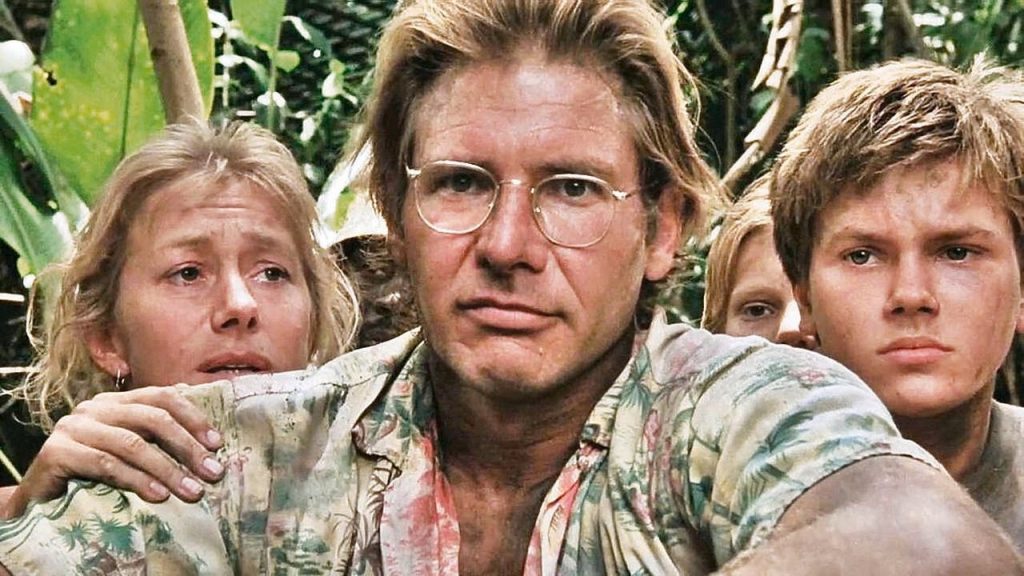The Mosquito Coast (1986)

One of the more overlooked gems in Harrison Ford’s (Indiana Jones and the Temple of Doom, Return of the Jedi) career, The Mosquito Coast gives the perennial everyman hero personality the chance to branch out by playing someone not so likeable. Peter Weir (The Truman Show, Master and Commander), who also directed Ford to success a year before in the Best Picture-nominated Witness, directs this Paul Schrader (Taxi Driver, Affliction) adaptation of the Paul Theroux novel, casting Ford as Allie Fox, a disgruntled American inventor who gets so pissed off at the loss of what he believes is a dying America, he decides to pack up his bags and family, taking them to the rain forests of South America to live a life away from civilization, and the threat of nuclear annihilation he believes is imminent. Stubborn to a fault, Allie’s family begins to miss the creature comforts of home, but he won’t listen to their complaints, believing their exile and hard life is the best thing for them. They struggle for survival amid the untamed environs, with religious zealotry, hostile guerrillas, and extreme weather conditions. Under the worsening pressure, the family threatens to crack, as Allie appears to become more quixotic in his quest for starting his own brand of civilization.
Harrison Ford has remarked that The Mosquito Coast is his personal favorite entry in his filmography, and though that does surprise given how many great films he’s been a part of, it definitely isn’t quite like any of his other films in terms of his performance. Perhaps one of the reasons that the mass public has continued to fail to embrace the film is that he works against the grain at every opportunity, playing a borderline villain, not unlike Captain Ahab in “Moby Dick”, willing to push his entire family to the brink of his own madness in order to come to a destiny that he keeps changing a firm position on.
Those attracted to the film because of the screen adaptation by vet Paul Schrader need not be surprised by the tone, as he has specialized in movies that are far from “happy ending” territory as possible. It should be noted that even in a Schrader adaptation that Allie Fox isn’t as much of an SOB as he is in the book form. The form of the film feels quite literary, with its thematic motifs, tendencies to develop character camps as allegorical devices, and underlying symbolism that is always present even in the most personal of scenes. Even a scene of Allie going to a hardware store to buy cable is rife with subtext, as he can’t stand to see American product replaced by cheaper Japanese imports. Fox is a mule that won’t submit to reason, preferring the hard road to the general complacency that he sees all around him in giving up pride and dignity for cheaper goods and easier ways of living. He can’t understand it and won’t be a part of it any longer.
As Fox continues to push further, it does often make one wonder whether he actually is an idealist or merely an egotist. I think the answer lies with the appearance of a couple of spark plugs, desperately needed to start a motor to keep the family from certain calamity, which Fox continues to refuse coming from an outside source. Allie’s eldest child (Phoenix, Stand by Me)must tell him he found them in order for them to be accepted, which does show that he isn’t trying to make things difficult so much as refuse to ever be assisted. One can argue that his whole repudiation of religion stems from his belief that man needs no assistance, even from God, even with our imperfections (Fox even thinks that human beings themselves are an imperfect design, so how can he respect the flawed inventor of man?).
With such heady aspirations, perhaps The Mosquito Coast will be considered an overreaching parable of the folly of man to think he can ever create a utopia, regardless of how far from civilization one goes. As Fox supposes all along, humankind is a flawed piece of work that will ultimately show its propensity for imperfection time and again. The same could be said about this ambitious and thoughtful film that might not quite know its bounds when it comes to how far it can go within the construct of its own peculiar universe, but like Allie Fox himself, we admire the effort, if not the methods to the madness.
Qwipster’s rating: A-
MPAA Rated: PG for language and violence
Running Time: 117 min.
Cast: Harrison Ford, Helen Mirren, River Phoenix, Conrad Roberts, Andre Gregory, Martha Plimpton, Jadrien Steele, Hilary Gordon, Rebecca Gordon
Cameo: Jason Alexander, Butterfly McQueen
Director: Peter Weir
Screenplay: Paul Schrader (based on the novel by Paul Theroux)
